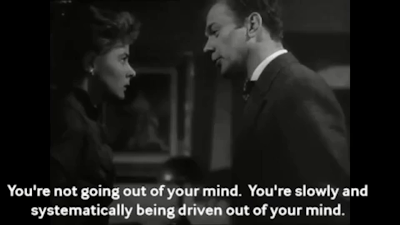 |
| But I thought that you said that the laptop wasn't Hunter's... |
The story begins with British orphan Paula being sent abroad in the wake of her aunt's brutal murder. Years later, Paula is following in her aunt's footsteps as she trains for a career as an opera singer. Before she can take to the stage, however, she embarks upon a whirlwind romance with the mysterious Gregory. The two are quickly married and she reluctantly agrees to return to London with him to live in the very townhouse where her aunt was murdered. Soon after their arrival the couple's' marriage becomes strained as Gregory flirts with their maid and explores the city, while insisting that Paula stay at the house alone in order to calm her agitated nerves. When he is gone she notices a number of seemingly inexplicable phenomena occur throughout the house as portraits disappear, footsteps echo from the roof, and the gaslights dim and brighten of their own accord. While she struggles to find an explanation for these occurrences Gregory accuses her of absentmindedness, theft, and finally madness. What follows is a masterful game of cat and mouse as Paula fights her husband's machinations even as her sense of reason comes ever closer to unravelling.
Gaslight offers a portrait of manipulation and madness so chilling that it has earned a place in the modern vernacular. While the plot focuses upon an abusive marriage, the film's depiction of psychological abuse applies equally well to machinations conducted by co-workers, friends, relatives, and even public institutions. Over the course of the past year the American public has been subjected gaslighting on a national scale. With the emergence of the coronavirus social media and legacy media colluded with health organizations such as the CDC, NIH, and WHO to form a narrative that would promote isolating lockdown policies, and dismiss China's role in the spread of the virus. Even now, as new data continues to emerge, the media relentlessly censors, de-platforms, and defames any private individuals, journalists, or even medical experts who dare to contradict the accepted narrative. In the midst of their distorted coverage of the pandemic big tech and the media subjected the public to even further manipulation by maintaining that the 2020 BLM and Antifa riots were "peaceful protests", and refusing to acknowledge the billions of dollars in damages and dozens of deaths that the riots left in their wake. This coverage sharply contrasted with that which was afforded to the January 6, 2021 riot in Washington D.C., which the media continues to insist was a massive insurrection that posed a direct threat to American democracy despite evidence to the contrary. Five months after the 2020 presidential election those who dare criticize election practices, let alone question election results, continue to be censored and denounced. Meanwhile the media and big tech continue to engage in actively avoiding, distorting, and concealing the new administration's mounting scandals.
In each of these instances those who defy the accepted narrative are ostracized, censored, and denounced in a manner that is eerily similar to the ways in which Gregory isolates, silences, and dismisses Paula. In the midst of such relentless psychological abuse it is all too easy for Americans to find themselves emulating Paula by questioning their knowledge, beliefs, and even their own mental health. When Paula finally learns the truth about her husband she wearily notes that, "this will be a long night". Like Paula, America finds itself in a dark chapter to which there seems to be no end in sight. As Detective Cameron aptly observes, however, "It will end...when the sun rises sometimes it's hard to believe there ever was a night". This night too will eventually end, but in the meantime it is up to those of us with dissenting voices to make our voices heard and spread the light of the truth to guide our way through this darkness.
The film comes to eerie life thanks to the outstanding work of its cast. Barbara Everest infuses Gregory and Paula's cook, Elizabeth, with warmth and strength. Angela Lansbury (in her screen debut) steals each scene in which she appears in her charismatic turn as saucy maid Nancy. Joseph Cotton conveys intelligence, honesty, and charm as dogged detective Brian Cameron. Charles Boyer is the perfect blend of suave, sinister, and sleazy as treacherous Gregory. Ingrid Bergman more than earned her Best Actress Oscar in her portrayal of Paula's harrowing journey from vivacious young bride, to traumatized victim, to resilient survivor.
Gaslight leads viewers through a maze of deception that will take them to the edge of insanity and back again. The film's intricate plot presents audiences with a fascinating puzzle, while its dynamic characters lend drama that is sure to keep viewers on the edge of their seats. The stellar cast shine in performances that remind us what was so classic about classic Hollywood. For a suspense drama that is sure to leave you guessing turn on Gaslight.



This comment has been removed by the author.
ReplyDeleteThis comment has been removed by a blog administrator.
ReplyDelete